What do you eat? Who do you pray to? How do you dispose of your dead? Looking back on the three books I’ve written so far in the Thrones & Bones series (Frostborn, Nightborn, and the just-finished third manuscript), I shouldn’t be surprised to see that I address these questions in each of the narratives. They appear to be staples of the way I world-build. But that second one—who do you pray to?—is really interesting. I put in a lot of work hammering out the pantheon of deities for each of my imaginary countries, but very little of it shows up in the finished product. A god of luck makes a minor intervention in Frostborn. A god is said to be responsible for a supernatural incident that is related to but not witnessed by the leads in Nightborn. In book three—well, no spoilers, but book three has a strong Grecian influence, and so divine beings may be a little more active than in the previous books.
When I look back at the books that I’ve loved over the years, I see that a lot of them deal with gods and goddesses as very large participants in their world, practically characters in their own right. Here are five books that have made a particularly strong impact on me and the way I think of the divine in fantasy fiction.
Elric: To Rescue Tanelorn by Michael Moorcock
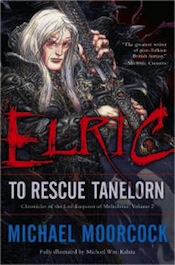 One of my first fantasy loves was Michael Moorcock. I encountered his Eternal Champion series early on and never got over it. That moment when a young Elric of Melniboné summons Duke Arioch, Lord of the Seven Darks, is absolutely chilling. If memory serves, the god appears first as a fly, then as a beautiful male youth who drips power and seduction. The Elric series was the first time I encountered gods who actively participated in their stories, the way the gods and goddesses of Greek mythology did. But there was a specific story, the novella “The Singing Citadel” (which I encountered in the collection/fix-up novel The Weird of the White Wolf, and which appears most recently in Elric: To Rescue Tanelorn), that has never left me. The minor god Balo, Jester to the Court of Chaos, is up to no good, and after battling the god ineffectually, a desperate Elric summons Arioch to deal with him. Arioch crushes Balo’s head, then wads the god up into a ball and swallows him. He tells Elric, “I have not eaten him… It is merely the easiest way of transporting him back to the realms from which he came. He has transgressed and will be punished.” I was both disturbed and fascinated by that scene, which haunted me for years, but it set my young brain puzzling. I realized then that gods were not made of the same mortal clay as we humans and did not have to abide by our rules. And speaking of rules…
One of my first fantasy loves was Michael Moorcock. I encountered his Eternal Champion series early on and never got over it. That moment when a young Elric of Melniboné summons Duke Arioch, Lord of the Seven Darks, is absolutely chilling. If memory serves, the god appears first as a fly, then as a beautiful male youth who drips power and seduction. The Elric series was the first time I encountered gods who actively participated in their stories, the way the gods and goddesses of Greek mythology did. But there was a specific story, the novella “The Singing Citadel” (which I encountered in the collection/fix-up novel The Weird of the White Wolf, and which appears most recently in Elric: To Rescue Tanelorn), that has never left me. The minor god Balo, Jester to the Court of Chaos, is up to no good, and after battling the god ineffectually, a desperate Elric summons Arioch to deal with him. Arioch crushes Balo’s head, then wads the god up into a ball and swallows him. He tells Elric, “I have not eaten him… It is merely the easiest way of transporting him back to the realms from which he came. He has transgressed and will be punished.” I was both disturbed and fascinated by that scene, which haunted me for years, but it set my young brain puzzling. I realized then that gods were not made of the same mortal clay as we humans and did not have to abide by our rules. And speaking of rules…
Deities & Demigods by James M. Ward and Robert J. Kuntz
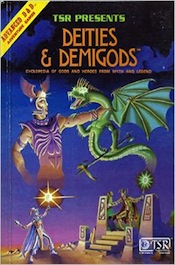 I’m cheating a little by including a rules supplement for first edition Advanced Dungeons & Dragons, but the 1980 Deities & Demigods from TSR made an enormous impact on my imagination. The first two printings included not only gods and demigods from real world mythology and TSR’s proprietary world of Greyhawk, but also stats for Arthurian characters, Fritz Leiber’s Nehwon setting, H. P. Lovecraft’s Cthulhu mythos, and the aforementioned Elric tales of Michael Moorcock. I was already a huge fan of Leiber and Moorcock, and this sent me off to read Lovecraft as well. Something about seeing all these gods, both “real” and fictitious, all alphabetized and statted out for a Game Master’s use was like a crash course in fantasy world-building and comparative religion. Better still, it encouraged ideas for how gods could be included in game scenarios of my own creation (and by extension my fictions). Later editions had to strip out the Leiber, Lovecraft, and Moorcock, as other gaming companies held those licenses, but I still have my original manual!
I’m cheating a little by including a rules supplement for first edition Advanced Dungeons & Dragons, but the 1980 Deities & Demigods from TSR made an enormous impact on my imagination. The first two printings included not only gods and demigods from real world mythology and TSR’s proprietary world of Greyhawk, but also stats for Arthurian characters, Fritz Leiber’s Nehwon setting, H. P. Lovecraft’s Cthulhu mythos, and the aforementioned Elric tales of Michael Moorcock. I was already a huge fan of Leiber and Moorcock, and this sent me off to read Lovecraft as well. Something about seeing all these gods, both “real” and fictitious, all alphabetized and statted out for a Game Master’s use was like a crash course in fantasy world-building and comparative religion. Better still, it encouraged ideas for how gods could be included in game scenarios of my own creation (and by extension my fictions). Later editions had to strip out the Leiber, Lovecraft, and Moorcock, as other gaming companies held those licenses, but I still have my original manual!
Wrath-Bearing Tree (A Tournament of Shadows #2) by James Enge
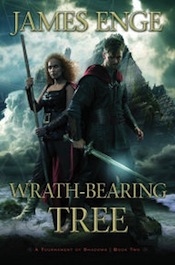 James Enge’s Morlock Ambrosius is one of my all-time favorite fantasy characters, up there with Elric, Fafhrd, the Gray Mouser, and Avatar Korra. Enge take the staples of the fantasy tradition and subverts them delightfully, without ever thumbing his nose at the tropes or being embarrassed to be unabashedly genre. It’s no surprise that he should do this with the gods and goddesses of his world of Laent as well. Nowhere is this more apparent than in Wrath-Bearing Tree, in which Morlock and his future wife, in between bouts of exploring each other sexually (this is no children’s book), are confronted with a host of small (and ill-made) gods produced when mortals ascend something called the Apotheosis Wheel and are transmogrified—often with horrifying results.
James Enge’s Morlock Ambrosius is one of my all-time favorite fantasy characters, up there with Elric, Fafhrd, the Gray Mouser, and Avatar Korra. Enge take the staples of the fantasy tradition and subverts them delightfully, without ever thumbing his nose at the tropes or being embarrassed to be unabashedly genre. It’s no surprise that he should do this with the gods and goddesses of his world of Laent as well. Nowhere is this more apparent than in Wrath-Bearing Tree, in which Morlock and his future wife, in between bouts of exploring each other sexually (this is no children’s book), are confronted with a host of small (and ill-made) gods produced when mortals ascend something called the Apotheosis Wheel and are transmogrified—often with horrifying results.
The Grave Thief (The Twilight Reign #3) by Tom Lloyd
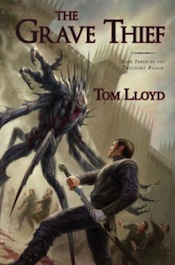 In Tom Lloyd’s Twilight Reign series, gods and goddesses can actually subsume each other and bind these defeated deities into serving as “aspects” of themselves. So the god of Death, for instance, controls multiple aspects like “Disease,” “the Burning Man,” etc. And some of these aspects would rather cast off the yoke and be the one driving the bus, so they scheme to accrue followers and seize the big chair. But in book three in the series, The Grave Thief, things get really interesting! Spoiler alert: The goddess of luck makes an unprecedented decision to choose a human as one of her aspects and then gets herself killed, leaving a human woman as the aspect of a dead god!
In Tom Lloyd’s Twilight Reign series, gods and goddesses can actually subsume each other and bind these defeated deities into serving as “aspects” of themselves. So the god of Death, for instance, controls multiple aspects like “Disease,” “the Burning Man,” etc. And some of these aspects would rather cast off the yoke and be the one driving the bus, so they scheme to accrue followers and seize the big chair. But in book three in the series, The Grave Thief, things get really interesting! Spoiler alert: The goddess of luck makes an unprecedented decision to choose a human as one of her aspects and then gets herself killed, leaving a human woman as the aspect of a dead god!
Blackdog by K. V. Johansen
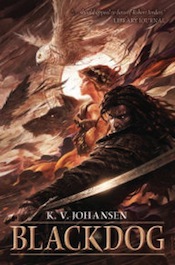 Every mountain, lake, and river has its own deity in K. V. Johansen’s Blackdog. Some are quite powerful and distant, some are mad, and others are like kindly village elders, keeping alive the oral history of the tribe and officiating at weddings. The lake goddess Attalissa is unique. She chooses to incarnate, being born as a baby and living a full life, then repeating the cycle again. When she is young, she is vulnerable, and so, long ago, she bound a dark spirit called the Blackdog to the life of a man. The Blackdog is her guardian and protector, and passes from man to man as each host dies. It is better when a host is willing, but not necessary. When unforeseen events force a very young incarnation to flee her temple, a rogue named Holla-Sayan becomes the newest host of the Blackdog. Holla-Sayan takes Attalissa back with him to the caravan roads, where he introduces her as… his illegitimate daughter! K. V. Johansen has done something I’ve never seen before—she’s told a coming-of-age tale about a goddess.
Every mountain, lake, and river has its own deity in K. V. Johansen’s Blackdog. Some are quite powerful and distant, some are mad, and others are like kindly village elders, keeping alive the oral history of the tribe and officiating at weddings. The lake goddess Attalissa is unique. She chooses to incarnate, being born as a baby and living a full life, then repeating the cycle again. When she is young, she is vulnerable, and so, long ago, she bound a dark spirit called the Blackdog to the life of a man. The Blackdog is her guardian and protector, and passes from man to man as each host dies. It is better when a host is willing, but not necessary. When unforeseen events force a very young incarnation to flee her temple, a rogue named Holla-Sayan becomes the newest host of the Blackdog. Holla-Sayan takes Attalissa back with him to the caravan roads, where he introduces her as… his illegitimate daughter! K. V. Johansen has done something I’ve never seen before—she’s told a coming-of-age tale about a goddess.
Top art by Michael Komarck for The Art of H.P. Lovecraft’s The Cthulhu Mythos
Lou Anders is the author of Frostborn, the first book in the Thrones & Bones middle-grade series, and its sequel, Nightborn. He likes reading and writing adventure stories and designing the board games that appear in the books (which you can play too!). You can learn more about him at louanders.com and more about the world of Thrones & Bones at thronesandbones.com.










Following on from the “comfort reading” post from earlier today, Lois McMaster Bujold’s Quintarian novels (The Curse of Chalion, Paladin of Souls, The Hallowed Hunt) need to be mentioned here. The theological principles of that world are actually quite subtle and profound – it’s better polytheology than I’ve come to expect from most practicing neopagans. Max Gladstone’s Craft series also features well-thought-out divine characters (and appropriately, the newest volume is out today).
Not an actual deity and not fantasy but Arkady & Boris Strugatsky’s 1964 SF novel Hard to Be a God is an interesting take on this kind of thing. It’s told from the perspective of a character (Anton) who is technically still an ordinary human, albeit one who is equipped with the technology of a more advanced civilization and a far greater perspective than the inhabitants of the medieval world he presently inhabits. Nonetheless, his powers are not infinite and he answers to a higher authority…
American Gods
Really? No Vlad Taltos novels? Several of which are about the gods, the interactions between the gods and the characters, and the gods’ own problems.
What about the Inheritance Trilogy by N.K. Jemisin, starting with the Hundred Thousand Kingdoms? Those books are extraordinary.
Warbreaker by Brandon Sanderson. It includes my favorite Sanderson character–a god who does not believe in his own religion.
No list of “Books with Gods” can be complete with out Steven Erikson’s Malazan books. (Heck, the German translation of the series is titled “The Game of the Gods”.) Gods are everywhere: Old gods, new gods, ancestral gods, Elder gods, forgotten gods, you name it. And the relationship between god and worshipper is explored and prodded in just about every form possible.
What about all of David Eddings’ books – gods and goddesses are absolutely integral characters to the story.
I feel a bit old here, but Fred Saberhagen’s Books of Swords (at least the early ones) deal with the fallout of the gods “game” of giving humans extremely powerful weapons (swords!) and watching them fight over them.
Also a few of the gods in Raymond Feists’s Riftwar saga either take an active part occasionally, or (on one occasion) talked into helping the major characters.
Oh, come on. How can you even start this list without Lord of Light, by Roger Zelazny? I’d even be willing to accept Creatures of Light and Darkness.
Folks, this isn’t a definitive list of the Best Books about Gods or the Most Important Books About Gods or even a list of books I think everyone should read. This is a list of five books that have made a particularly strong impact on me personally as a writer. That’s all. Hence the sentence, “Here are five books that have made a particularly strong impact on me and the way I think of the divine in fantasy fiction.” I’m not trying to suggest the all time greats; I’m looking back at my own library and seeing what has stayed with me through the years and informed my own thinking and process.
BUGTOWN from those annoying post brothers …… late 80s very early 90’s comic….. fun read
How can you not include the Elenium and the Tamuli by David Eddings? Not only are Gods and Godesses part of the cast, but they create new gods along the way!
Thank you for the article Lou Anders. I enjoyed reading it.
A few of Weis & Hickman’s series could be in this list: Rose of the Prophet and Dragonlance being the 2 that come to mind off the top of my head.
Steven Brust’s To Reign in Hell is pretty much all gods/devils.
I also agree with #8 with David Eddings.
Again, not a definitive list. Not a best of list. Not even a complete list of all the books I’ve personally read in which the divine play active roles in the plot. Simply a list of the five top books in my own library whose influence I see in my own work. If it’s not on the list, it’s because I either didn’t read it, or because it’s influence on me didn’t personally outshine the influence of the five I chose. Operative word, “personally.”
Deities & Demigods, hah! You do cheat by including it, but I’d have done the same. I sadly only ever had Legends and Lore, its later incarnation. But damn was that book influential and informative, not only for D&D but for world myths.
Thanks, JLaSala. I know it’s cheating but it really is an influence. Also, I’ve still got my original copy!
I’d also throw a shout-out to Louise Cooper’s Time Master trilogy — sadly forgotten these days, but had one of the most interesting takes on Law vs. Chaos that I’ve ever seen — well worth tracking down used copies.
And gods also played a significant role in Moorock’s Corum books — in fact, in some cases the same gods as were in the Elric books, albeit in different roles/incarnations.
And thanks for reminding me that I really, really need to read Enge’s second trilogy, and all of K.V. Johansen.
My Deities & Demigods is, sadly, called Legends & Lore, but I do have photocopies of the pages with the Cthulhu and Melnibonean pantheons. EDIT: No, it’s actually Deities & Demigods, with the Erol Otus cover! But it’s a later printing, sans Cthulhu and Elric.
(And along the same lines, for myself I’d add the D’Aulaire Greek & Norse myths; and, heck, the Harryhausen Jason & the Argonauts and Clash of the Titans.)
Small Gods, Terry Pratchett, said basically everything.
Jemisin was my immediate thought, followed by the multitudes cited above (Bujold, Brust, Zelazny, Gaiman, etc).
Let’s add Daniel Abraham’s Long Price Quartet – the entire series is about ability of the “poets” to create and control Gods.
A couple that spring to mind are American Gods by Gaiman and the gods of Discworld. If one must go, Sir Pterry’s Death seems a lot more accommodating than most.
Oh! The Silmarillion!
Fred Saberhagen’s Book of the Gods series
How about Roger Zelazny’s Lord Demon?
All good books.
_Touched by the Gods_ by Lawrence Watt-Evans features some very involved deities.
Some of my more atheistic friends would toss in _The Bible_ as the original fantasy anthology involving a deity here, but I don’t think that was the editorial intent when it was created.
I would’ve included Clive Barker’s Weaveworld and Imajica … as well as Fritz Leiber’s divinities in his Fafhrd and the Grey Mouser stories … then there’s ER Eddison’s The Worm Ouroboros and his Zimiamvian trilogy, Mistress of Mistresses, A Fish Dinner in Memison, and the Mezentian Gate (sadly unfinished) … not forgetting the only consistently good book CS Lewis ever wrote, Till We Have Faces (which I in my reaction against an overly religious upbringing, renamed, Till We Have Faeces until I realized it was truly awesome … ) and how could I have forgotten that truly extraordinary book, David Lindsay’s Voyage to Arcturus? Not to forget the Glimmung in Phillip K Dick’s Galactic Pot Healer … am I the only one?
As SaltManZ said. The Malazan Book of the Fallen is all gods. It is in effect the story of wizards trying to become gods and calling down a foreign god, that cluster-f@cked the entire world and cause the entire painfully beautiful plot in the first place.
What about Sanderson’s original Mistborn trilogy? Not only do you have Ruin and Preservation, but you have a major character ascending to godhood at the end of the series in the form of Harmony.
hmm, how about
– philip jose farmer’s world of tiers (loads of gods who have loads of fun building universes to kill each other)
– robert a heinlein, strange in a strange land (numerous gods, and of course the prodigal son)
– j c grimwood redrobe / remix (if you allow a Buddhist AI to be Buddha’s incarnation, assuming we allow for Buddha to be defined as god)
– james morrow: only begotten daughther (features her of course and then god, who apparently is a sponge)
– Iain M Banks (can’t pin it down, but must be somewhere in his books)
– Frank Herbert’s Dune (if we allow for Muad’Dib as a good)
Thank you, Lou, for an interesting article. I always enjoy an author’s perspective and what their influences are. Paired with my favorite theme of gods/goddesses in fiction – I really enjoyed.
Thanks for posting this. I’ll second the thought that it’s always interesting to see what authors cite as influences! :
I appreciate your list, but I would have to add Dan Simmons’ Illyium and Olympus as well as Stephen Brust’s To Reign in Hell. Also, to not include Lovecraft just seems like a large omission.
My list would include Banewreaker and Godslayer by Jacqueline Carey. At least one god plays a very active key role and is one of the main characters in both of The Sundering stories.
Also the Incarnations of Immortality series by Piers Anthony, which I’m really surprised no one else mentioned.
I definitely second Ilium and Olympos, Stranger in a Strange Land, and American Gods (which should probably mean Anansi Boys, but I’ve not read that one yet).
Thank you for this interesting list Lou. More books have now been added to the “to read” pile.
Hadn’t reached the quarter mark of the article when Lightsong popped into my head, but Perene @6 beat me to it. Also pondered on the Reckoners series – in a way, the Epics are revered by some as the new gods, ain’t it? Also good point, Jason_UmmaMacabre @29, though you might argue that we could include all the Cosmere in, then (which is perfectly fine with me :) )
Great suggestions by everyone, kudos, but no love for Michael Scott Rohan’s Winter of the World? This would have to be one of the best examples of the article title I can think of.
Edit: Also how could I forget Jack L. Chalker’s Midnight at the Well of Souls? A definitive and classic example of the subject.
I’d heartily recommend Tyranny of the Night by Glen Cook. The gods themselves don’t get much attention as individual characters until later in the series, but the opening novel is outstanding.